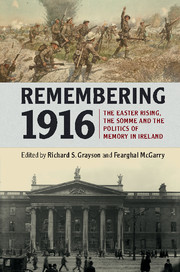Book contents
- Frontmatter
- Contents
- List of figures
- List of tables
- List of contributors
- Introduction
- Part I Memory and commemoration
- Part II Narratives
- Part III Literary and material cultures
- 8 The Rising generation and the memory of 1798
- 9 Cultural representations of 1916
- 10 Myth, memory and material culture: remembering 1916 at the Ulster Museum
- Part IV Troubled memories
- Index
10 - Myth, memory and material culture: remembering 1916 at the Ulster Museum
from Part III - Literary and material cultures
Published online by Cambridge University Press: 05 March 2016
- Frontmatter
- Contents
- List of figures
- List of tables
- List of contributors
- Introduction
- Part I Memory and commemoration
- Part II Narratives
- Part III Literary and material cultures
- 8 The Rising generation and the memory of 1798
- 9 Cultural representations of 1916
- 10 Myth, memory and material culture: remembering 1916 at the Ulster Museum
- Part IV Troubled memories
- Index
Summary
Introduction
The centenary of the First World War in Northern Ireland not only involves consideration of our past but also our present and future as a ‘post-conflict’ society. Northern Ireland is emerging from a thirty-year period of conflict (commonly referred to as ‘the Troubles’) which erupted in 1969 and ended with paramilitary ceasefires and a political agreement in 1998. However, political tensions and community divisions remain and there is little agreement on how to deal with the difficult legacy of our past. Therefore, as we creatively engage with the impact of the defining period of revolutionary change surrounding the First World War, where can our collective imagination take us? Can a more complex interpretive approach to the First World War and the pivotal events of 1916 become a model for considering our difficult recent history? This chapter will examine the role of the Ulster Museum as it navigates the contemporary social and cultural environment in Northern Ireland and the politics of identity. It will consider the historic role of the Museum in collecting and interpreting the First World War and the Easter Rising, along with its more recent attempts to challenge prevailing myths in pursuit of complex and inclusive narratives.
The greatest challenge for the Museum looking forward lies in dealing with the difficult and divisive legacy of ‘the Troubles’. The contemporary relevance of the events of 1916 to the Troubles is exemplified in two objects in the collection made by republican and loyalist prisoners. One is a plaque depicting ‘James Connolly 1916 The Irish Rebel’ and was made by republican prisoners in the Maidstone prison ship in the early 1970s while it was docked off Belfast (see Figure 10.1). The plaque was signed by the men who made it. The other object commemorates the Battle of the Somme and was painted by Gusty Spence, the former leader of the modern Ulster Volunteer Force (see Figure 10.2). Each consciously seeks to establish a direct link between the modern Irish Republican Army (IRA) and Ulster Volunteer Force (UVF) and the loyalist and republican movements of the early twentieth century. Therein lies the core of the problem around the meaning and commemoration of 1916 – its compression and appropriation to justify political violence and reinforce loyalist and republican claims of legitimacy during Northern Ireland's recent conflict.
- Type
- Chapter
- Information
- Remembering 1916The Easter Rising, the Somme and the Politics of Memory in Ireland, pp. 181 - 204Publisher: Cambridge University PressPrint publication year: 2016
- 3
- Cited by

